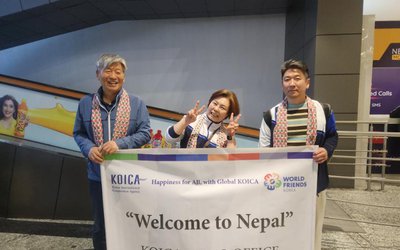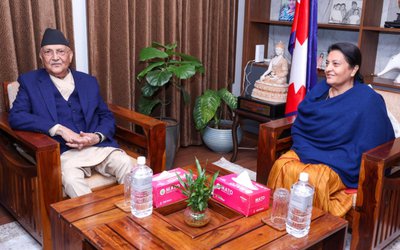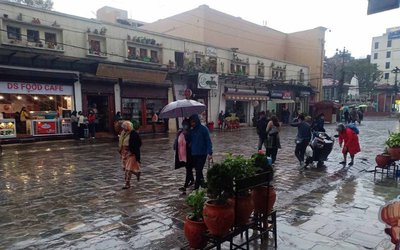
School girls in far away Doti are interacting with students from Europe, sharing their experiences over the internet. Some students in Jhapa are producing mushroom. Some schools are teaching the students to make traditional bamboo buckets for a commercial purpose.
Isolated for years in villages, schools in Nepal have finally found the chance to connect with international schools thanks to the International Schools Award under British Council's 'connecting schools' program.
Produced by British Council, a 10-minute documentary, which was shown at a program in Kathmandu to hand over the ISA Award to the Nepalese schools, showed how classrooms of the schools of remote parts of Nepal have been changing since the introduction of connecting schools.
In the presence of parents, teachers and students, British Council Nepal awarded International Schools Award to eleven Nepalese schools and reaccredited two schools at an event on 15 September 2016. This award is endorsed and supported by the Ministry of Education and this is the fourth year, Nepali schools are being awarded through this award scheme.
When special guests Ms Katherine Smitton, Deputy Head of Mission, British Embassy in Kathmandu and Narahari Aryal, Deputy Director, Department of Education, Government of Nepal, jointly provided the award, there was joy and happiness among the teachers and students.
Connecting schools program has contributed greatly to make Nepalese students global citizens. The documentary has also shown that the situation of Nepalese schools and students has changed a lot over the decade.
After watching the activities, including concert and drama, both the special guests congratulated the winners and shared the importance of being global citizens in today’s time.
Twenty five schools from eight districts of Nepal had submitted their dossier out of 100 schools initially working on International School Award. Full Award is granted to Eleven Schools out of these 25 dossier submissions. Two schools that were awarded in 2012 have been reaccredited for ISA awards this year.
The schools receiving the full award provided with a trophy and certificates and will be allowed to use the coveted International School Award kite mark along with their school logo on all the official stationeries and promotional materials for a period of three years.
As said by Dr. Jovan Ilic, Country Director of British Council, “In an increasingly globalised economy, it is vital that our students are prepared for working and communicating with each other regardless of international borders. Nepali students are just as connected as UK students. For them to thrive in a competitive world, they must develop digital literacy, and 21st Century Skills such as critical thinking, problem solving skills, creativity and imagination, leadership, and team building. With the International School Award they do this by making a commitment to becoming responsible and caring global citizens and learning what this means in practice.”
What is International School Award (ISA)?
ISA is a yearly award given to participating schools. Applications from interested schools are called in every year, August/September period and schools are selected on the basis of their application. The British Council offers the ISA as an accreditation framework for schools to record and evaluate their international work and embed it into the curriculum. ISA acts as a benchmark that ascertains schools as having an outstanding level of support for nurturing global citizenship in young people and enriching teaching and learning.
The ISA approach to school development is holistic and mirrors the curriculum based project work approach to encourage the teachers to use with their students. It is rigorous and evidence based process. It encourages the leaders to foster teambuilding, innovation, and project management.
ISA is content free and schools are encouraged to embed it within their own curriculum. ISA gives context to practice new skills in Information & Communications Technology (ICT) and pedagogy in a safe and structured manner. Participating in briefings and workshops, online community and the award ceremony brings together a large number of schools across the country fostering rich exchange of ideas and creating a vibrant community of education professionals.
Evaluation process
A team of representatives from the British Council, Department of Education and Curriculum Development Centre is developed. The dossiers or the portfolio of evidence submitted by the participating schools are evaluated and school visits are organized to see the authenticity of the work and learning outcomes in the children. With the evidences submitted and the outcome of school visits, the schools are granted the award.
Connecting Classrooms, a project implemented by British Council and funded by DFID, is designed to help young people develop the knowledge, skills and values to live and work in a globalized economy, and makes a positive contribution locally and globally. The program, running from 2015-2018, will build the capacity of 45,000 teachers and 12,000 school leaders worldwide to support them to integrate a range of core skills into the curriculum.
Connecting Classrooms aims to improve teaching in both the UK and Nepal in the following key areas of professional development for teachers and school leaders, sustainable partnerships between schools in the UK and Nepal, professional dialogue opportunities for policy makers, awards to schools which are successful in equipping young people with the knowledge and skills to live and work in a globalized economy and online access to high quality resources to support teachers in delivering improved learning outcomes for young people.
The schools includes Kathmandu English School, Creative Academy Kirtipur, Akshara School Kathmandu, Reliance Co-Ed Kathmandu, Spiral Galaxy High School Kaski, Palpa Aawasiva Higher Secondary School Palpa, Motherland Higher Secondary School Kaski, New Horizon Higher Secondary School Palpa, Shree Punya Higher Secondary School, Dhankuta, Paragon Academy Jhapa and Padmodaya Public Model Higher Secondary School Dang. Reaccredited Schools include Annal Iyoti School Kathmandu and Gurukul Academy Dhangadi.
The past four years of experiences have shown that ISA has helped to improve overall quality in the school system making them at par with the international standards. Connecting the schools program has indeed been connecting the Nepalese schools to the globe.
- UML POLITCIS: Oli Vs Bhandari
- Apr 29, 2025
- FORMER KING GYANENDRA: Bating Constituional Monarchy
- Apr 28, 2025
- NC-UML COALITION: In Turmoil
- Apr 27, 2025
- TEACHERS ON STRIKE: Students' Future In Jeopardy
- Apr 25, 2025
- NEPAL-THAILAND: Joint Business Council
- Apr 13, 2025














